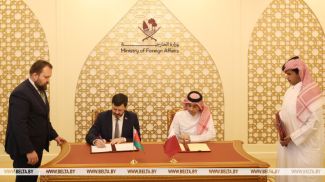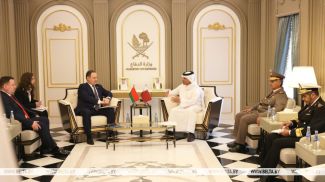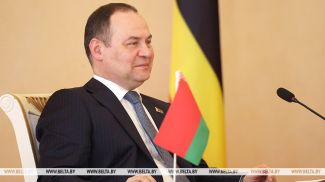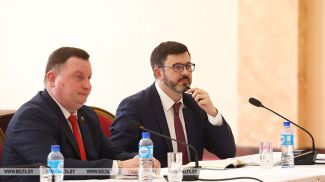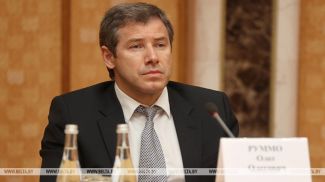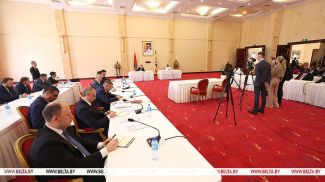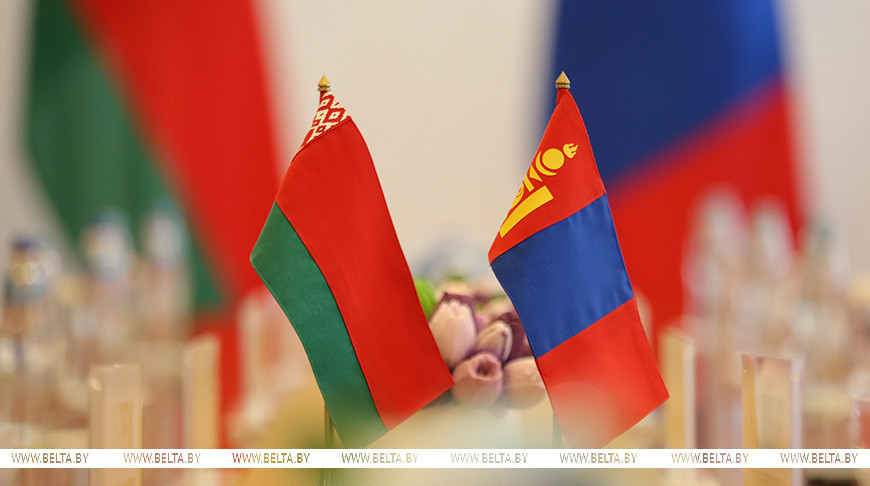
MINSK, 7 June (BelTA) - Belarus and Mongolia have already started implementing the agreements reached during the recent state visit of Belarusian President Aleksandr Lukashenko to this country, Belarusian Minister of Foreign Affairs Sergei Aleinik told the media, BelTA has learned.
"The state visit of the Belarusian president to Mongolia is a historic event without exaggeration. This is the first visit of a Belarusian head of state to the country. This visit opens a new page in our bilateral relations. It was planned and prepared in line with our strategy to develop relations with geographically distant countries,” the minister said.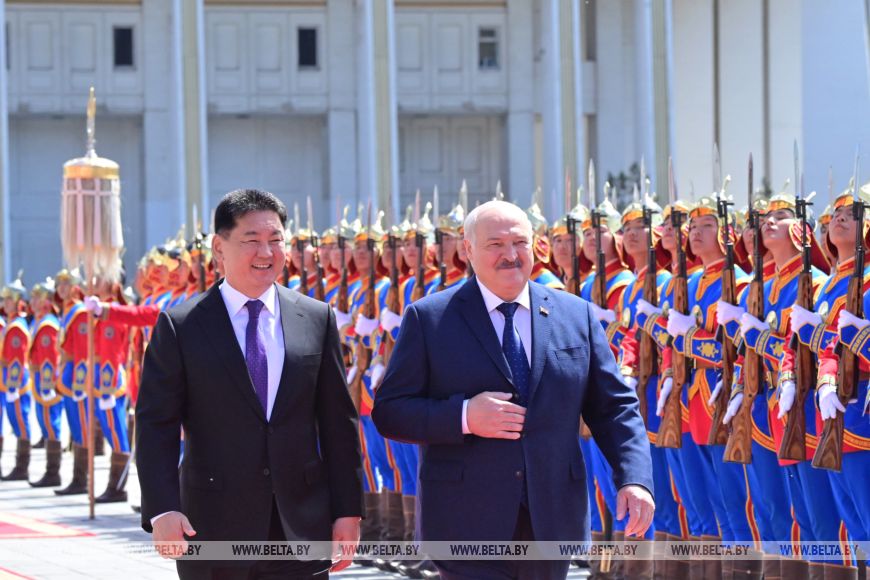
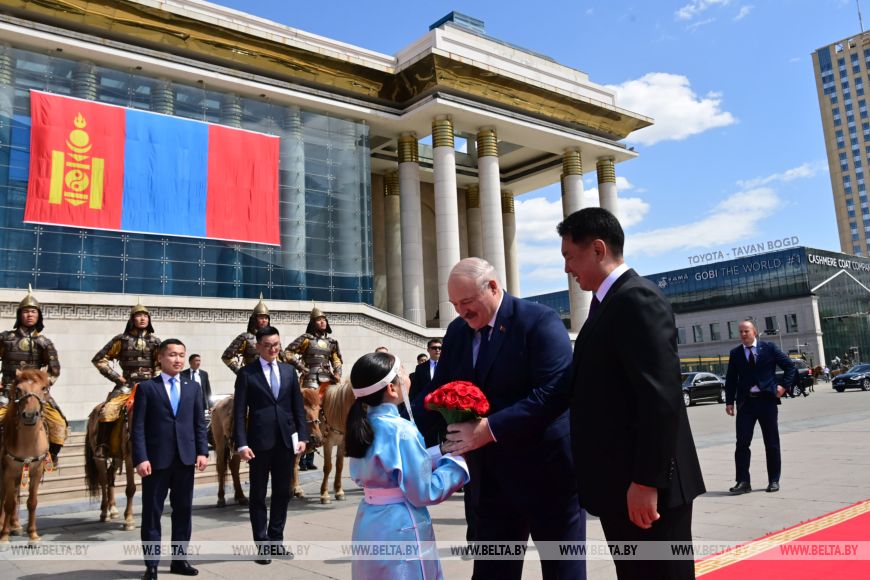
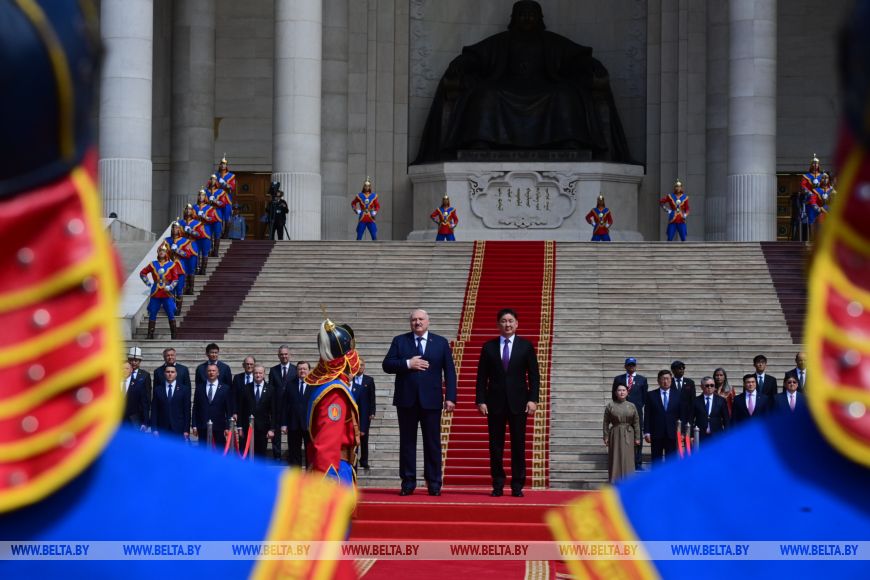
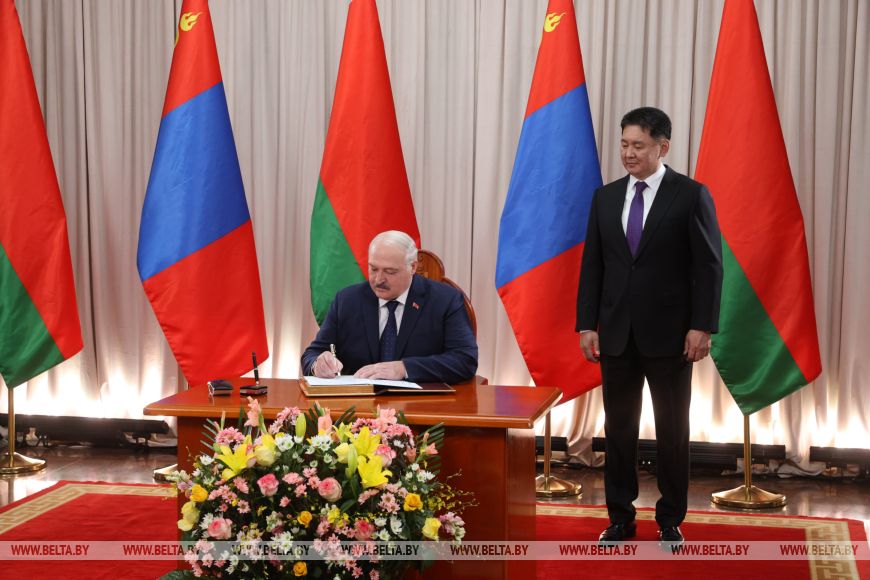
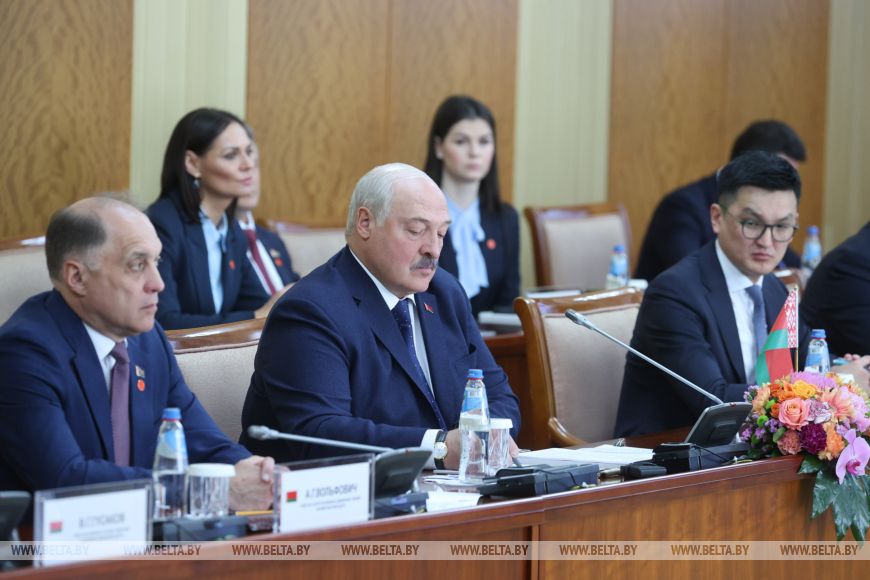
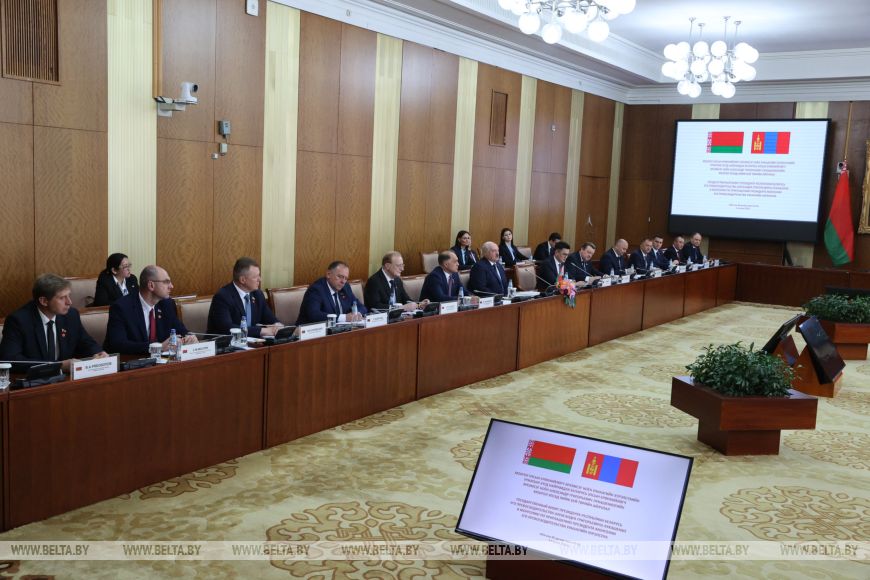
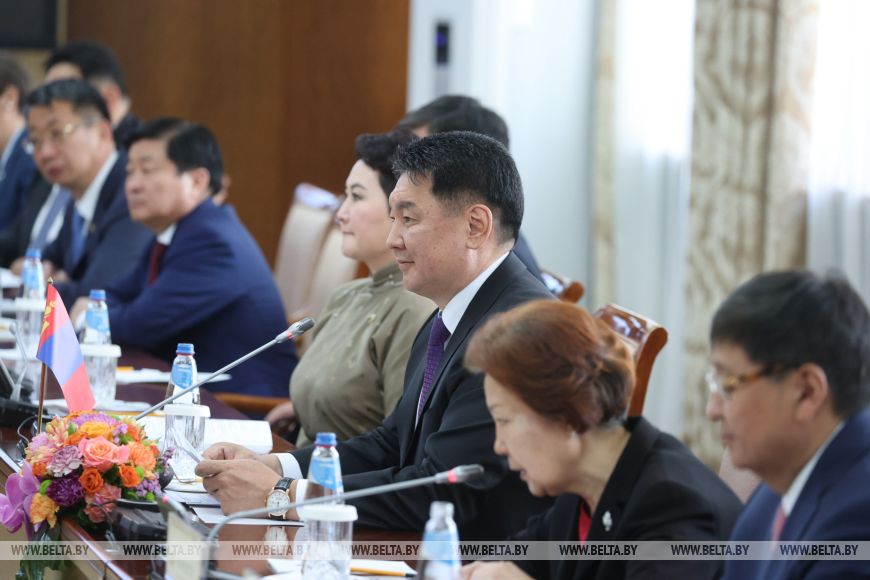
"It is gratifying that we immediately started to implement the agreements and literally the following day after the state visit of the Belarusian president, a large delegation of 40 people headed by the Mongolian minister of agriculture and light industry went to Minsk to participate in the international exhibition Belagro. These days, meetings and negotiations between Belarusian business entities and Mongolian partners are taking place. I am sure that these negotiations will result in additional agreements," the minister stressed.
In general, Sergei Aleinik sees mutual interest in the cooperation from the Mongolian side: "This was quite obvious within the framework of inter-industry and sectoral meetings. This was clearly seen at all stages of bilateral negotiations."
The minister noted that the parties need to work on improving conditions for mutual trade, industrial-technological projects.
Sergei Aleinik separately mentioned the decision of the Supreme Eurasian Economic Council of 8 May of this year to start negotiations with Mongolia on an interim trade agreement. "We expect to finalize the agreement by the end of this year. According to our opinion, the opinion of our Mongolian colleagues and partners in the EAEU, it will open qualitatively new opportunities and will lead to a significant increase in trade and create more favorable conditions for trade through the removal of duties and barriers,” Sergei Aleinik noted.
"The state visit of the Belarusian president to Mongolia is a historic event without exaggeration. This is the first visit of a Belarusian head of state to the country. This visit opens a new page in our bilateral relations. It was planned and prepared in line with our strategy to develop relations with geographically distant countries,” the minister said.




He emphasized that the example of Mongolia clearly shows how this strategy is being put into practice. The many hours of communication between the heads of state during the visit made it possible to discuss, in a very friendly and trusting atmosphere, the whole range of bilateral relations, exchange views on global and regional issues and, most importantly, to define a strategy for the further development of relations.
"Economy is at the heart of everything. Issues of trade and economic cooperation were given the closest attention. Belarusian and Mongolian economies are complementary. The countries can organically combine the potentials of the economies and implement mutually beneficial projects of trade and economic cooperation,” the minister said.
According to him, about 30 bilateral documents were signed during the visit. "Undoubtedly, the main, fundamental document is the Treaty of Friendship and Cooperation between the Republic of Belarus and Mongolia. A number of commercial contracts and contractual arrangements, interagency and intergovernmental agreements were signed in agriculture, education, science, security and law enforcement, emergency situations, tourism, intellectual property,” the minister said. “A package of commercial contracts and agreements were signed on the margins of the business forum. We estimate the economic effect of this visit at several tens of millions of U.S. dollars in the medium term. In the long term this figure can increase significantly in case we see through all projects.
Belarus and Mongolia signed a roadmap for the development of cooperation for 2024-2026. It contains more than 50 measures and projects in 16 sectors and areas of activity. “This is the mainline document, which should be implemented qualitatively and bring our bilateral cooperation to a new level,” Sergei Aleinik said.
The minister said that industrial-technological cooperation and agricultural projects were on the agenda. For example, during the visit, ground was broken for a project to build a dairy farm using Belarusian technologies. In general, there is great interest on the part of Mongolian partners in developing cooperation in agriculture and ensuring food security. Special attention was paid to these issues during the visit, and a separate roadmap was signed with regard to agriculture.
The parties have also agreed to develop cooperation in other areas and have an understanding of the need to build interregional ties.
"Economy is at the heart of everything. Issues of trade and economic cooperation were given the closest attention. Belarusian and Mongolian economies are complementary. The countries can organically combine the potentials of the economies and implement mutually beneficial projects of trade and economic cooperation,” the minister said.
According to him, about 30 bilateral documents were signed during the visit. "Undoubtedly, the main, fundamental document is the Treaty of Friendship and Cooperation between the Republic of Belarus and Mongolia. A number of commercial contracts and contractual arrangements, interagency and intergovernmental agreements were signed in agriculture, education, science, security and law enforcement, emergency situations, tourism, intellectual property,” the minister said. “A package of commercial contracts and agreements were signed on the margins of the business forum. We estimate the economic effect of this visit at several tens of millions of U.S. dollars in the medium term. In the long term this figure can increase significantly in case we see through all projects.
Belarus and Mongolia signed a roadmap for the development of cooperation for 2024-2026. It contains more than 50 measures and projects in 16 sectors and areas of activity. “This is the mainline document, which should be implemented qualitatively and bring our bilateral cooperation to a new level,” Sergei Aleinik said.
The minister said that industrial-technological cooperation and agricultural projects were on the agenda. For example, during the visit, ground was broken for a project to build a dairy farm using Belarusian technologies. In general, there is great interest on the part of Mongolian partners in developing cooperation in agriculture and ensuring food security. Special attention was paid to these issues during the visit, and a separate roadmap was signed with regard to agriculture.
The parties have also agreed to develop cooperation in other areas and have an understanding of the need to build interregional ties.



"It is gratifying that we immediately started to implement the agreements and literally the following day after the state visit of the Belarusian president, a large delegation of 40 people headed by the Mongolian minister of agriculture and light industry went to Minsk to participate in the international exhibition Belagro. These days, meetings and negotiations between Belarusian business entities and Mongolian partners are taking place. I am sure that these negotiations will result in additional agreements," the minister stressed.
In general, Sergei Aleinik sees mutual interest in the cooperation from the Mongolian side: "This was quite obvious within the framework of inter-industry and sectoral meetings. This was clearly seen at all stages of bilateral negotiations."
The minister noted that the parties need to work on improving conditions for mutual trade, industrial-technological projects.
Sergei Aleinik separately mentioned the decision of the Supreme Eurasian Economic Council of 8 May of this year to start negotiations with Mongolia on an interim trade agreement. "We expect to finalize the agreement by the end of this year. According to our opinion, the opinion of our Mongolian colleagues and partners in the EAEU, it will open qualitatively new opportunities and will lead to a significant increase in trade and create more favorable conditions for trade through the removal of duties and barriers,” Sergei Aleinik noted.




